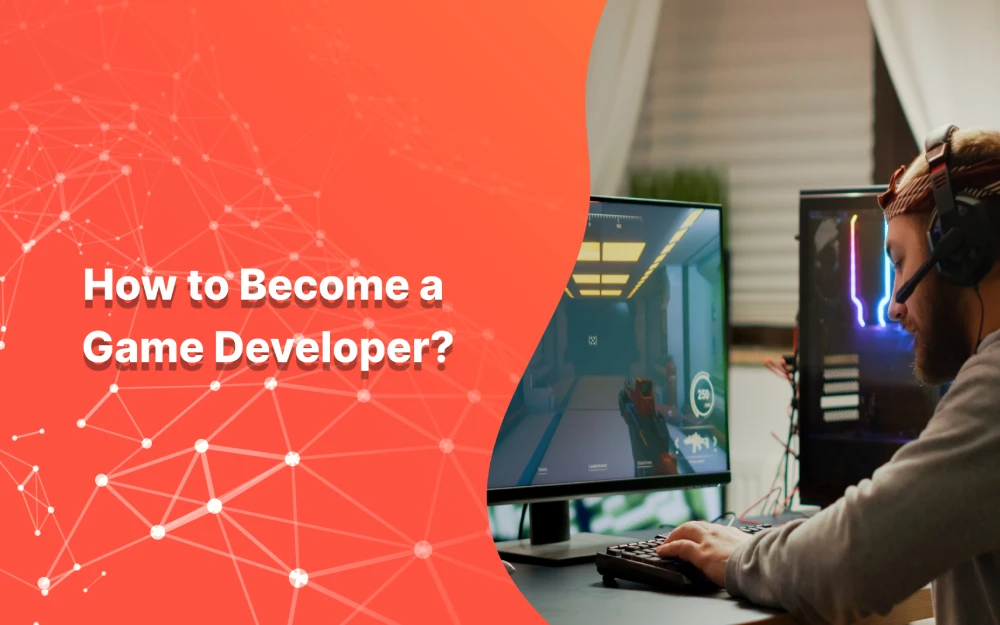Who is a Game developer?
In the modern era of technology and entertainment, video games have become an integral part of our lives. Behind the immersive and captivating worlds of games lies the creative genius of game developers. These talented individuals are the architects who bring our gaming fantasies to life, crafting experiences that transport us to alternate realities and challenge our imaginations. In this blog, we will delve into the fascinating world of game developers, exploring their role, skills, and the immense impact they have on the gaming industry.
The Role of a Game Developer
Game developers are the masterminds who transform ideas and concepts into playable and interactive experiences. They conceive, design, and build video games across various platforms, including consoles, PCs, mobile devices, and virtual reality. Whether working independently or as part of a team, their goal is to create compelling and enjoyable games that resonate with players.
Skills and Expertise
1. Programming: Game developers possess strong programming skills, often specializing in languages such as C++, C#, or Java. They use programming languages and frameworks to write the code that forms the backbone of a game, implementing features, mechanics, and behavior.
2. Game Design: Understanding game design principles is crucial for game developers. They conceptualize gameplay mechanics, define rules, create levels, and balance difficulty to ensure an engaging and enjoyable player experience.
3. Graphics and Animation: Game developers work with graphic artists and animators to integrate visually appealing elements into their games. They collaborate on creating stunning environments, character models, textures, and animations, bringing the game world to life.
4. Audio Engineering: Sound and music play a vital role in enhancing the gaming experience. Game developers work with sound designers and composers to integrate audio effects, background music, and voice overs, creating an immersive audio landscape.
5. Problem-Solving and Analytical Thinking: Game developers must possess strong problem-solving and analytical skills. They encounter challenges throughout the development process, ranging from technical issues to gameplay design problems. Their ability to find innovative solutions is essential for creating polished and enjoyable games.
The Game Development Process
Game development follows a multi-stage process, typically including:
1. Conceptualization: This stage involves brainstorming and conceptualizing game ideas, defining the game’s genre, mechanics, and target audience.
2. Pre-production: During pre-production, game developers create detailed design documents, storyboards, and concept art. They outline the game’s scope, create prototypes, and plan the development timeline.
3. Production: This phase involves the actual coding, asset creation, and implementation of game elements. Game developers collaborate closely with artists, sound designers, and other team members to bring the game to life.
4. Testing and Iteration: Rigorous testing is crucial to identify and fix bugs, glitches, and gameplay issues. Game developers conduct extensive playtesting and gather feedback to refine and improve the game’s mechanics and overall experience.
5. Release and Post-Release Support: Once the game is complete, game developers oversee the release process, ensuring compatibility with different platforms and handling distribution. They may also provide post-release support, releasing updates and patches to address issues and add new content.
Impact and Future of Game Developers
Game developers are at the forefront of the booming gaming industry, which generates billions of dollars in revenue annually. Their creations entertain, inspire, and transport players to new worlds, fostering creativity, social interaction, and storytelling.
As technology advances, game developers have exciting opportunities to explore emerging technologies such as virtual reality (VR), augmented reality (AR), and cloud gaming. These advancements open new avenues for immersive experiences and innovative gameplay mechanics.
Game developers are the visionary architects of interactive entertainment, crafting experiences that captivate and engage players worldwide. Their diverse skill sets, creativity, and passion drive the growth and evolution of the gaming industry. Whether you find yourself lost in a fantasy realm, competing in a multiplayer battle, or solving intricate puzzles, remember that behind every game, there is a dedicated team of game developers striving to create an unforgettable experience. So, the next time you embark on a gaming adventure, take a moment to appreciate the intricate craftsmanship and dedication of these talented individuals who bring joy and excitement into our lives.
How to Become a Game Developer?
Becoming a game developer requires a combination of skills, knowledge, and practical experience. If you’re passionate about creating games and want to pursue a career in game development, here are some steps you can take:
1. Define Your Goals and Specialization: Game development is a broad field, so start by determining your specific interests and goals within the industry. Consider whether you want to focus on programming, game design, art and animation, audio engineering, or a combination of these areas.
2. Learn Programming Languages: Familiarize yourself with programming languages commonly used in game development, such as C++, C#, or Java. These languages form the foundation of many game engines and frameworks. Online tutorials, books, and educational platforms like Coursera and Udemy offer resources to learn programming fundamentals.
3. Gain Knowledge in Game Design: Understanding game design principles is crucial for creating engaging and enjoyable experiences.
Study game design concepts, mechanics, player psychology, and storytelling techniques. Books, online courses, and resources from experienced game designers can help you develop a solid foundation in game design.
4. Acquire Game Development Tools and Engines: Familiarize yourself with game development tools and engines such as Unity, Unreal Engine, or Godot. These engines provide a framework for building games, offering visual scripting systems or programming interfaces to bring your ideas to life.
5. Practice and Create Projects: Start working on small game projects to apply your skills and gain practical experience. Start with simple games, gradually increasing the complexity as you become more proficient. This will help you understand the development process, problem-solving, and working with game assets.
6. Build a Portfolio: As you create projects, compile and showcase your work in a portfolio. A portfolio is crucial for demonstrating your skills and abilities to potential employers or clients. Include descriptions, screenshots, videos, and any relevant documentation to showcase your projects effectively.
7. Collaborate and Network: Engage with the game development community by joining online forums, attending local meetups, and participating in game jams. Collaborating with other developers, artists, and designers can expand your knowledge, provide feedback on your work, and open up opportunities for collaboration or job referrals.
8. Learn from Others: Stay updated on industry trends, game development techniques, and new technologies through blogs, online tutorials, and industry publications. Learning from the experiences of other game developers and participating in online communities can help you stay motivated and informed.
9. Continue Learning and Improving: Game development is an ever-evolving field, so it’s important to stay curious and continuously improve your skills. Stay updated on new technologies, tools, and development practices through online resources, workshops, and professional development programs.
10. Seek Job Opportunities or Freelance Projects: Once you feel confident in your skills and have a strong portfolio, start applying for game development jobs or consider freelancing to gain more experience. Look for job openings on specialized game development job boards, company websites, and online freelancing platforms.
Remember, becoming a game developer is a journey that requires dedication, practice, and a passion for creating interactive experiences. Embrace the learning process, take on challenges, and continuously refine your skills to enhance your chances of success in the exciting world of game development.
What is a game development roadmap?
A game development roadmap outlines the steps and milestones involved in creating a game from start to finish. It serves as a high-level plan that helps guide the development process and ensures that various aspects, such as design, programming, art, and testing, are properly managed. While specific game development roadmaps may vary depending on the project, here is a general roadmap that can be followed:
1. Conceptualization and Planning:
– Define the game concept, genre, target audience, and overall vision.
– Conduct market research and analyze existing games in the genre.
– Create a game design document outlining the game mechanics, story, characters, levels, and goals.
– Determine the project scope, timeline, and budget.
2. Pre-production:
– Refine the game design document, incorporating feedback and making necessary adjustments.
– Create concept art, storyboards, and mock-ups to visualize the game’s aesthetics and gameplay.
– Develop a technical design document that outlines the technology, tools, and platforms to be used.
3. Production:
– Develop the core game mechanics, implementing features and functionality.
– Create or integrate game assets, including 3D models, textures, animations, sound effects, and music.
– Build levels, environments, and user interfaces.
– Perform continuous playtesting and iteration to refine the gameplay, balance, and user experience.
– Implement backend systems, such as network functionality or online features, if applicable.
4. Quality Assurance and Testing:
– Conduct thorough testing to identify and fix bugs, glitches, and gameplay issues.
– Perform compatibility testing on different platforms and devices.
– Seek feedback from testers and make necessary improvements.
– Optimize performance and ensure the game runs smoothly.
5. Polishing and Finalization:
– Refine visuals, audio, and user interface elements.
– Fine-tune gameplay mechanics, controls, and difficulty levels.
– Implement additional features, bonus content, or unlockables.
– Conduct final testing and bug fixing to ensure a stable and polished game.
6. Release and Post-Release:
– Prepare for the game’s release, including marketing, distribution, and platform-specific requirements.
– Launch the game on the intended platforms, such as app stores, digital distribution platforms, or consoles.
– Gather player feedback and reviews to address any issues or bugs post-release.
– Provide updates, patches, and additional content to enhance the game’s longevity and address player feedback.
It’s important to note that the game development roadmap can be flexible and subject to adjustments based on the project’s needs, team size, and constraints. Regular communication, collaboration, and iteration throughout the development process are crucial to ensure a successful game launch.
Finding tech jobs in Egypt can be tough. techitopia is a platform where you can get your desired job without any hassle & in less time







